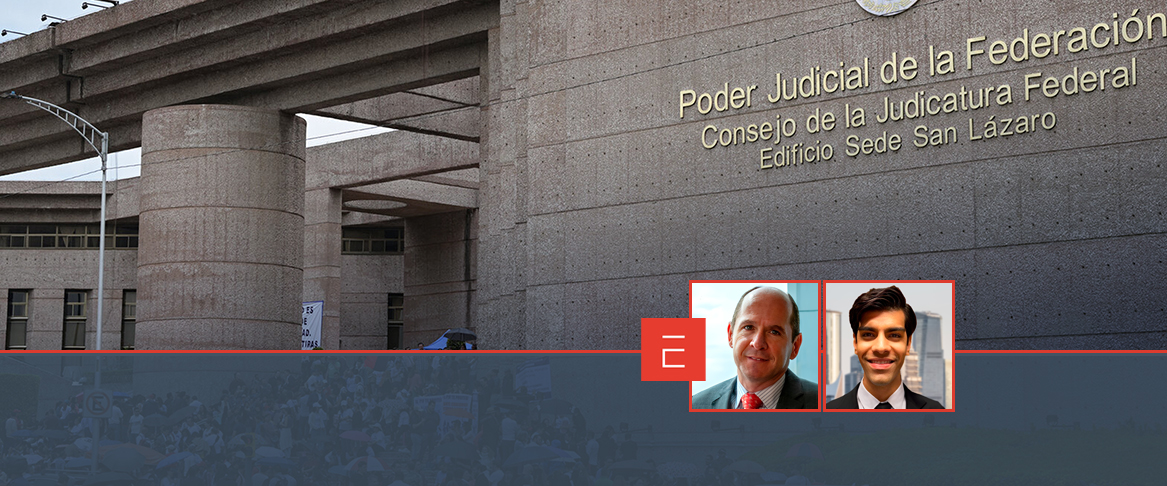Indefinite Suspension of Activities in the Federal Judiciary: Judges and Magistrates Protest Against Judicial Reform
The indefinite suspension of activities in the Federal Judiciary comes on the eve of the discussion of the judicial reform initiative in Congress on August 26, with approval expected in the following September session. Since August 19, 2024, thousands of Federal Judiciary workers have gone on indefinite strike; on the 21st of that month, magistrates and judges will join, formally declaring the suspension of jurisdictional activities in all Federal Courts and Tribunals nationwide.
The National Association of Circuit Magistrates and District Judges of the Federal Judiciary announced that out of 1,403 judges who participated in the vote, 1,202 voted in favor of protesting against the judicial reform initiative proposed by the President, which includes, among other things, the election of ministers, magistrates, and judges by popular vote—a measure widely rejected by Federal Judiciary workers.
Through Circular 16/2024, the Executive Secretary of the Full Council of the Federal Judiciary announced that, in its session on August 19, 2024, the Federal Judiciary Council recognized the situation unfolding in the country, acknowledging the notices of work suspension sent by the heads of the jurisdictional bodies due to the strike organized by workers assigned to these bodies.
The aforementioned circular also establishes that, despite the work stoppage, and in the interest of preserving the public service of justice delivery, jurisdictional bodies must attend to the urgent matters described therein, including:
- In Federal Criminal Justice Centers:decisions regarding the validation of detentions, linking to proceedings, the implementation and modification of precautionary measures related to pre-trial detention, and decisions on extradition.
- In Execution Centers and District Courts specialized in this area:(i) decisions involving danger to life or personal integrity, (ii) actions preceding imminent sentence fulfillment, (iii) pre-release benefits already determined pending execution (preparatory, early, and conditional release); and (iv) urgent agreements on detention conditions concerning medical care by the third sanitary level (hospitalization), segregation, and torture.
- In District Courts:matters included in Articles 126 and 127 of the Amparo Law and Article 48 of the General Agreement of the Full Council of the Federal Judiciary, which establishes the provisions on the administrative activity of jurisdictional bodies, including but not limited to: (i) proceedings to receive preparatory statements, (ii) actions during the pre-instruction period (until the resolution that decides the legal status of the detainee), (iii) arrest orders, (iv) acts that endanger health or personal integrity, (v) all related to health rights, (vi) those related to immigrants, (vii) those that may endanger the supply of essential services like water or electricity.
- The National Justice CenterSpecialized in Control of Investigation Techniques, Arraigo, and Communication Interception must attend to precautionary measures, preventive measures, and investigation techniques, considering that paragraph 13 of Article 16 of the Constitution establishes the obligation for their immediate attention.
- In the Federal Labor Court of Collective Affairs based in Mexico City: cases related to strike procedures as provided for in sections XVII, XVIII, and XIX of paragraph A of Article 123 of the Constitution and Articles 920 to 937 of the Federal Labor Law.
- In Circuit Collegiate Courts:appeals referred to in Article 97, section I, subparagraph b) of the Amparo Law, under the jurisdiction of Circuit Collegiate Courts, arising from amparo trials deemed urgent. It will also be considered urgent to continue with the elaboration and processing of decisions where constitutional protection has previously been granted before the suspension of activities.
- In Appellate Collegiate Courts:appeals referred to in Article 135 of the National Code of Criminal Procedure, provided they stem from omissions related to matters considered urgent for Justice Centers, the National Justice Center Specialized in Control of Investigation Techniques, Arraigo, and Communication Interception, and the competent District Judges; as well as appeals referred to in Articles 284 and 303, fifth paragraph of the National Code of Criminal Procedure.
- In civil matters: decisions on precautionary, preventive, or protective measures in cases of domestic violence and violence against women in general; decisions on current alimony and amparo affecting the best interests of minors.
- In all matters, the resolution of jurisdictional conflicts arising from all acts considered urgent.
- In general, to determine whether a matter is urgent, the following will be considered: (i) the human rights at stake, the impact of their possible violation, and the consequences of waiting for the conclusion of the labor suspension; and (ii) the possible differentiated and intersectional impacts on access to economic and social rights for people in particularly vulnerable situations, with an emphasis on health-related issues.
- Other mattersthat, in the opinion of the judge, meet the characteristics of urgency according to the laws governing them.
Notwithstanding the above, it is clear that the impact of this strike will not be limited solely to the judicial sphere but will significantly affect the resolution of disputes and, consequently, the proper functioning of businesses. The indefinite suspension of activities in the Federal Judiciary will result in hundreds of cases awaiting resolution, generating legal uncertainty for those involved in litigation, potentially leading to economic losses, especially for those who depend on judicial decisions to continue their operations or protect their rights in legal disputes.
For businesses, this means that judicial conflicts could escalate to levels that further compromise the legal security and stability necessary for investment and economic growth.
The strike in the Federal Judiciary in Mexico has the potential to impact the country’s economy. Companies and entrepreneurs must be prepared for a scenario in which judicial paralysis translates into delays, additional costs, and greater legal uncertainty. In this context, it is crucial that all involved parties seek alternative dispute resolution methods that ensure the continuity of justice, the protection of labor rights, and economic stability in Mexico.
ECIJA Mexico
socios.mexico@ecija.com
+52 55 5662 6840
www.ecija.com






